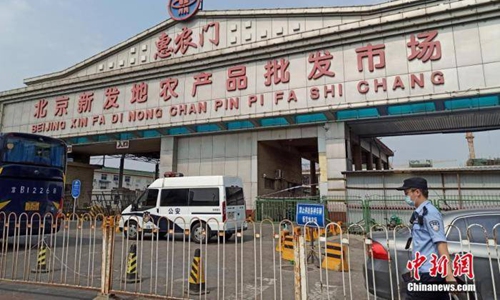31 provinces, regions tighten health checks on Beijing arrivals
By Xu Keyue Source:Global Times Published: 2020/6/17 22:21:23

Beijing Xinfadi Market. Photo: Chinanews.com
As Beijing raised its response to Level II from Level III against the COVID-19 infection spike, and after four provinces reported confirmed cases related to the capital city's new outbreak, 31 provinces and regions in China have tightened health checks on arrivals from Beijing.A health expert the Global Times reached said it's important for local governments to urge residents to report their travel and contact histories from Beijing's Xinfadi wholesale market, where the latest outbreak emerged.
As of Wednesday afternoon, 31 provinces and regions including the Macao Special Administrative Region have issued prevention and control policies, Chinese media outlet Jiemian.com reported.
The strictness of the measures vary.
A government employee in Baoding, North China's Hebei Province, which governs Xiongan New Area, told the Global Times on Wednesday that people from Beijing areas rated medium or high risk have been requested to go on quarantine for 14 days and undergo nucleic tests three times during the 14-day quarantine period.
They also have to take a serum antibody test and a CT scan for pneumonia detection, the employee said. Those who came from low risk areas in Beijing to Xiongan only need to show their health code.
The response comes after Hebei reported its one new confirmed case in Xiongan New Area, who was in close contact with Beijing's cases, and three asymptomatic cases, one of whom had close contact with a Beijing-related case. Those areas in the province stepped up their health checks on arrivals from Beijing.
Harbin, the capital of Northeast China's Heilongjiang Province, appears to have enforced the strictest health checks on arrivals from Beijing. An operator of the city government's hotline said people from Beijing's medium- and high-risk areas have to go on a 14-day centralized quarantine and seven-day home quarantine. They were urged to undergo four nucleic tests and one serum antibody test during the quarantine.
People from Beijing's low risk areas should also go on two to three days of centralized quarantine, take two nucleic tests and one serum antibody test. Only those tested negative for the COVID-19 could go on home quarantine under the local community's supervision until the centralized and home quarantine reach 14 days in all.
Wang Peiyu, the deputy head of Peking University's School of Public Health, told the Global Times on Wednesday that although Heilongjiang has not reported local cases related to Beijing's new outbreak, Harbin's measures are understandable, as it saw a spike of imported cases in April, and sounded the alarm over local infections related to cases from outside.
Also on Wednesday, the Macao Special Administrative Region said those who have been to Beijing within 14 days of arriving should be on a 14-day quarantine.
Except for Macao, 30 provinces and regions are inspecting products and the environment of local food and wholesale markets.
Beijing reported 31 new local cases on Tuesday, bringing the total to 137 from Thursday after 55 consecutive clear days. Four provinces - Hebei, Zhejiang, Sichuan and Liaoning - have confirmed cases related to Beijing's cases.
Posted in: SOCIETY